Syria: Bosra, Palmyra
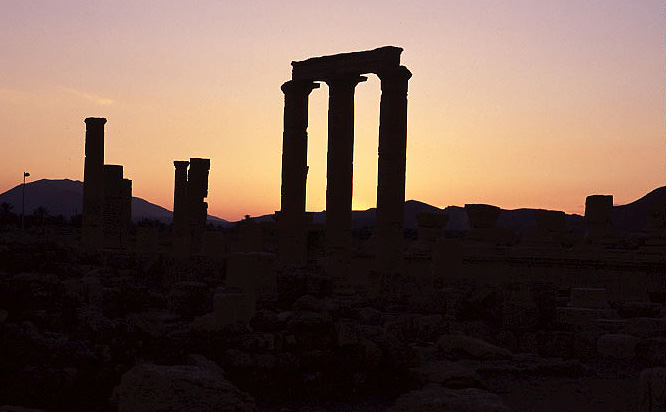
December 27, 2003
The morning came around far too early, despite my early bedtime last night, and I was loathe to leave the comfortable bed, with its massive, 20 lb. comforter and thick wool blanket. Nothing fancy or expensive. But, delightful to sleep in. I quietly got some of my stuff together and tip-toed down the stairs, disturbing no-one until I opened the front door and woke one of the staff of the Al Harramin who was sleeping on a padded bench next to the door. I told him that I was heading to Bosra and would be back tonight. He fell back asleep and I trundled out into the cold morning air. I intended to take a service taxi to the proper bus station, but chickened out and hailed a regular taxi instead, which cost me the princely sum of 50 pounds.
At the bus station I did the normal routine of walking up to someone who looked like they were used to being at the bus stop and asking, "Dera'a?" A direction. Another person. "Dera'a?" Another direction. I found the rickety old bus heading to Dera'a and hopped on, after asking an old man on board, "Dera'a?" I really should have listened to some Arabic tapes to find out how to ask properly and correctly, "Where does this bus go?" The 25 pound fare bought me a ride on one of the least comfortable of buses. Zero leg room. Metal bars in the seat in front of me, rather than padding. No suspension on the old thing. And, it was cold this morning. The 90 minute ride seemed to take much longer than that and I was very happy to get off the bus in a large parking lot in Dera'a and stretch my legs. I was immediately pointed to a small mini bus on the far end of the lot, as it was pretty clear what a whitey was doing in Dera'a: Going to Bosra.
The mini was almost full and when I hopped on it took off in a roar for the famed Roman amphitheater. Romans had built the massive structure, and when it came under control of the Arabs, a large citadel was build around it, forming an interesting architectural combination. The mini dropped me off (the only tourist on board) in front of the the main entrance to the citadel, but my first stop was outside of it. There was a substantial "Old Town" to Bosra and I wanted to poke around it for a while before going inside for the main attraction. There were a couple of Europeans wandering around the closest ruin, but after them I saw no other tourists.
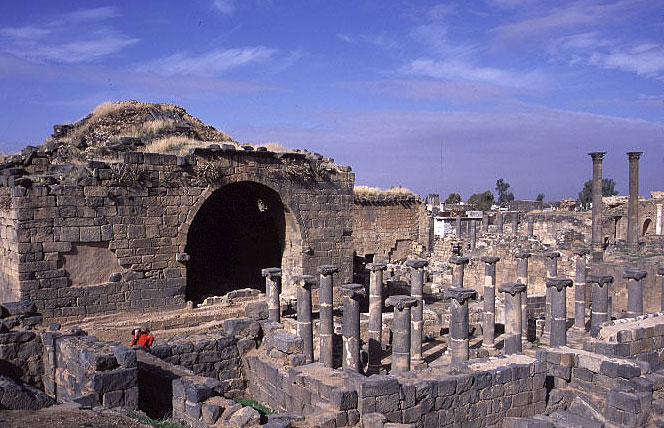
The Old Town is a long sequence of ruins, with no signs or ropes or anything else to help you interpret what you are seeing. The tourist has to rely on what he knows already, and an active imagination. You can go where ever you like, although people live around, and actually inside of, the Old City. The ruins for a sort of town, with several mosques on the outskirts providing boundary markers.
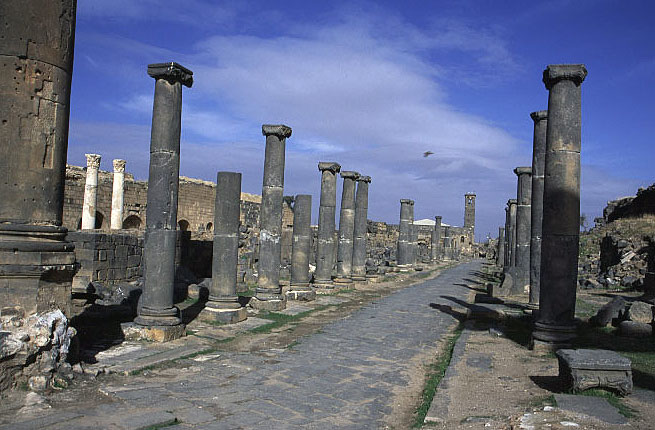
The lack of ropes or development excited me and I spent two hours wandered about the ruins, carefully at times as there were frequent drop offs and other places where you had to be careful with you footing. I eventually reached what my guidebook called the "Nabatean Arch". It was certainly an arch and looked like an entrance to the old city, and I knew that the Nabateans were some sort of culture from antiquity, but that was about it.
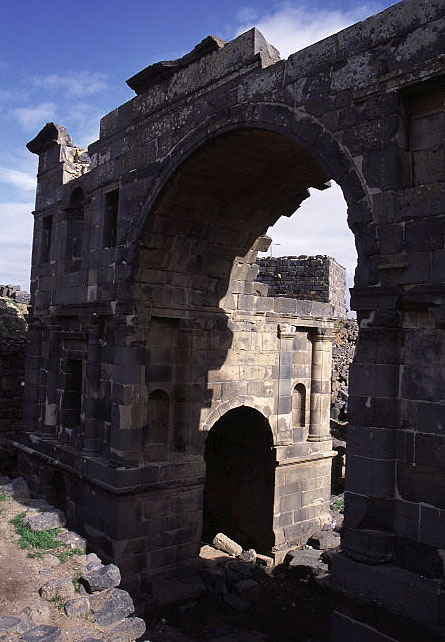
The day had warmed up to a pleasant temperature as I made my way over to the citadel, which cost 150 pounds to get in. The guards didn't have change for my bill and so waved me through, indicating that I should pick up change on the way out. In Nepal or Central America, I would have balked at this. In Syria, there was no reason to. Tourists had begun to roll in, including a couple of large tour buses with official looking guides to lead them around the citadel and amphitheater and tell them what they were seeing and what it was for.
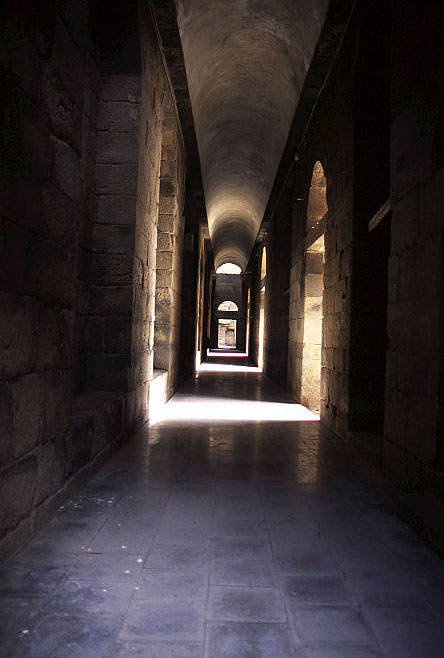
The citadel was dark and had many passages going every way possible. But, no matter which way I went, I always eventually began running toward the light. I'd make a turn into a dark passage way, hoping to get lost, but everything ran into the open amphitheater. The blinding light, after the darkness of the citadel's passageways, too a few minutes to get used to and I found myself sitting about midway up the steep steps from the main stage. The amphitheater was clearly not for fighting animals, as the seats ran straight down to stage level. Rather, it was for acting and music. The Syrians put on an annual festival here (as the Lebanese do at Baalbek), but it wasn't for a couple of months. Too, bad, I thought, as this would be a really spectacular place to spend a desert night watching a play.
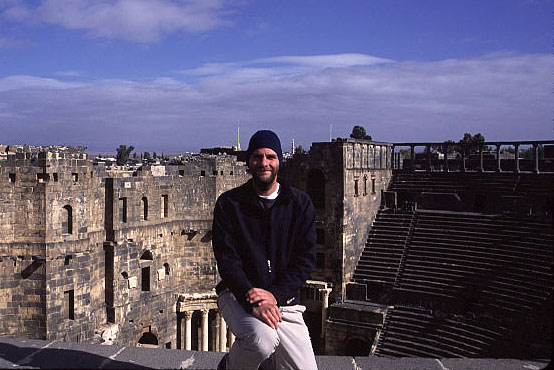
I walked up the stairs to the upper row to try to get a handle on the size of the theater and was much amused that my camera, even at its widest setting of 28mm, could only take in about two thirds of the massive structure. One of the tour groups, evidently from Japan, amused themselves by singing a song on the stage, and it was quite audible even at the top. However, tour groups are on a schedule and the participants soon filtered out of the amphitheater, leaving it to myself and a few other independents.

I walked around the stage area for a while, poking around in the many hall ways where actors would pass, and even had to use my headlamp frequently to find my way in the pitch black tunnels.
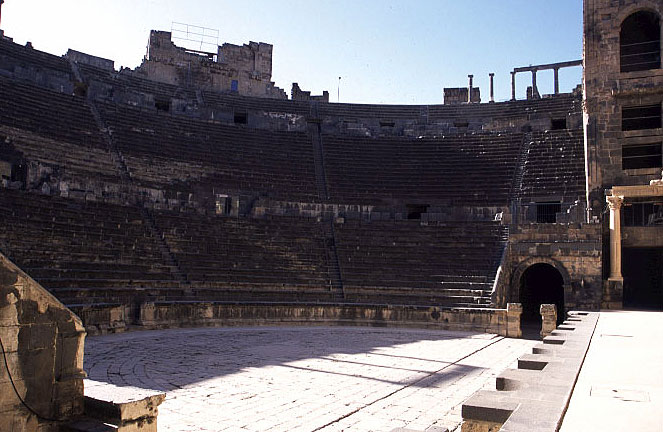
I still had more of the citadel to explore and spent an hour walking along the ramparts, finding, much to my delight, that there was a mini-plaza on top in which several statues and other carvings were on display. No signs, but they were not needed; I used my imagination instead and was satisfied.

I was all Bosra-ed-out and so retreated to the Alladin restaurant, picking up my change from the guards on the way, and settled in, the only person there, for a late lunch of roasted chicken, pickles, bread, and tea for 250 pounds. I tried some Arabic on the one man working the restaurant, but he didn't seem to understand anything I was saying. I was trying to ask him where I should catch the bus. I couldn't very well start with my "Dera'a? Dera'a?" routine here in the restaurant, so I paid and walked out into the city, confident I would catch a lift quickly.
I wandered out to near where I had been dropped off and started up a conversation with two post-card hawkers. After it became clear that I didn't want to buy anything, life became more civilized and we chatted, in broken English for a couple of minutes before one of them flagged down a mini and I was on my way to Dera'a. The trip to Dera'a was the normal high speed racing, but I was a little dismayed when I found that the bus station was almost empty. "Damascus? Damascus?"
I eventually found myself in a yellow office talking with two burly looking clerks who seemed to run a bus company. In my weak understanding, they seemed to want my passport and 50 pounds. Hopefully they understood that I wanted to go to Damascus. When I produced the US passport, they were astonished and their English got a lot better. I told them twice in Arabic that I was American, and then a couple of times in English as well. One showed me where to wait and shooed away some kids who were milling about doing not much of anything. When the kids found out I was American, I had my hands full. It was like they were meeting some kind of rockstar. I entertained them for ten minutes and then got on the bus to sleep. A large Greyhound like bus, I was surprised when it rolled out with only ten people on it. It hammered along, even when (twice) the drivers assistant came around with water and candy for the passengers. That never happens on the Big Grey Dog!
It was starting to get dark when the bus rolled into Bamake terminal in Damascus. Although slightly confused about where I was, I decided to walk back to Al Harramin, as this was much more entertaining than a taxi ride. Crowds were out and I had to go in a few circles before I oriented myself properly and headed in, I was sure, the right direction. I pushed through the crowds and eventually came out onto the main road that runs toward the Old Town and souq and was able to get home after only 20 minutes of walking. Definitely better than a taxi ride.
I was heartily welcomed by the staff at the Al Harramin, who seemed to be a little nervous that I was actually coming back tonight. I paid my bill as I was planning to leave early tomorrow as well for Palmyra, far out in the eastern desert. I took a quick shower and then went out for another evening stroll, snapping up three cheese pizzas (15 pounds for a great meal), another liter of Arak, a half kilo of pastries, and making a swing by Kemal's for coffee and a last chat. It was nice just sitting for a while with Kemal and the Africans, and as I was starting to feel like something of a regular there. All I needed was a little more grey in my beard and the ability to speak Arabic properly and I would have fit right in, sitting there on the plastic chairs and drinking down the thick coffee with delight.
Although I really felt like sleeping late in the comfortable bed for this, my last morning in the Al Harramin, I did need to get an early start to make it out to Palmyra, far in the desert, at a reasonable hour. I wanted to get some coffee at Kemal's one last time, and say goodbye to him, but he wasn't open at the early hour of eight o'clock. I walked out to the main street and waved down a mini bus that seemed to have some space in it. "Karajat harrasta?" I mumbled. "Karajat harasta?" I tried again. I got some kind of nod and hopped in, hoping that the mini might actually go to the bus terminal that I was trying to get to. Even if it didn't, the ride was only costing me 5 pounds, which is about a fifth the price of a shawarma.
The mini bus roared around to various stops, picking people up and dropping them off, before pulling up next to a curb where there were some other minis sitting. The driver waved at me and I got out, pretty sure that I was not at the Karajat Harrasta. I'd have to take another mini bus, but I figured that I was somewhere within a few miles of the bus station and the weather was fine out, so I began to hoof it down the road. I used my best mixture of travelese and Arabic to get a taxi driver to point down a big, main road, which seemed to be the way to the bus stop. I followed this large road, enjoying the general lack of traffic and basic views of life in Damascus. Thirty minutes of walking got me to a bridge where I could spy the bus station.
I walked into the crowded station which,like all the others I had been to, was in the open air and crowded with people of all sorts: drivers, assistants, ticket men, coffee and tea vendors, boys selling watches, travelers, and a (very) few whiteys. I went through my usual routine to find the Palmyra buses and was eventually led into a six foot square office with a young man sitting behind something that resembled a desk. Apparently, the next Palmyra bus wasn't due to leave until noon. I found this rather odd, as Palmyra should be a relatively well served city. I walked around the various other stalls and everyone confirmed that there was indeed only one company running a bus out to Palmyra.
I bought a couple cups of coffee and some pastries for breakfast and tried to use the time as effectively as I could. This meant sitting around a lot. One of the bus drivers saw me sitting and started up a conversation with me, I think because I looked lonely. Cheery and funny, even though I could only understand every third or fourth word, we talked for a while as he tried to convince me to go on his bus to Latahkia, one of the few Syrian cities on the coast. After the driver got on his bus and pulled out, I was beseiged by the boys with the watches. Three or four gathered about trying to get me to buy a watch from them, but I pointed out that I already had one on my wrist. Granted, my watch had been beaten up over the last few years and originally came from K-Mart, but they didn't know that. One would show me a fancy watch face, and I would show him the chronometer feature on mine. Another would show me the night light on one of his models, and I would show him mine. When it became clear that my watch was just as good as what they had, they sat next to me and just talked. This was wonderful as they spoke more English than I did Arabic, but not by much. It was wonderful because I was not longer just a walking dollar, but rather someone to talk with. And, an American to boot. At one point I had a crowd of seven or eight teenagers grouped around me, but occasionally an older teen would come by and chastise the younger ones into getting back to the business of selling watches. Once the older boy would go away, the younger ones would come back.
I passed an hour with the watch vendors and then was able to board my bus which had, much to my surprise, assigned seating despite the fact that there were only a dozen people on board. I was used to the med-on-the-right, women-on-the-left routine, but I had to change seats with an old man in whose seat I was sitting. Despite the fact that the West uses "Arabic" numerals, the numbers on my ticket didn't seem to resemble those I learned in kindergarten. The bus rolled out into the streets of Damascus and I fell asleep quickly, awaking only once we were solidly in the Syrian desert. The landscape reminded me a lot of the west Texas badlands, rather than the Mojave. A few low mountains on the horizon, a lot of brown, and not much else. Not stunning like the Mojave or Death Valley, but pretty in its own right. We passed a road sign pointing the way to Baghdad, and I wondered if any one else on board thought this was a neat thing, especially as I was the only whitey in the bus.
The bus dropped me off at a small gas station on the outskirts of town in the mid afternoon. Town was nowhere to be seen, but I figured it couldn't be far away. A man came up to me and asked me if I wanted a taxi ride into town. He quoted me a price of 500 pounds, about twenty times what I thought it should cost. I actually chuckled at the outrageous mark up and told him I would walk. This he found rather amazing and warned me that it was five kilometers into town and that I wouldn't make it. I thought this even funnier and smiled gregariously and waved as I set off down the only road I could think to follow.
I liked being out in the air and it made me feel rather tough strolling through the Syrian desert all by myself. Of course, this was silly and I was on a road, but I've gotten similar feelings walking on railroads tracks in scenic southern Illinois as well. I call this my Huck Finn feeling. About a kilometer down the road I had reached the outskirts of town when a man in a beat taxi pulled alongside and asked me if I wanted a ride into town for 25 pounds. Sure, why not. He asked me where I wanted to go and I pulled a name out of my guidebook, "New Aqfa Hotel." The driver whisked me over to it through a maze of streets, which would have taken me forever to negotiate. The hotel was quite posh, with a youngish English speaking assistant manager, who informed me that there were no single rooms available, only one double left. All for the low, low price of 350 pounds. I looked around the empty hotel and didn't quite believe him. But, the sun was getting into the perfect position for a desert light show and I wanted to get out into the ruins when the light was perfect. Tramping around to save 100 pounds, and missing the light show in return, seemed like a poor idea. I dropped off some gear in my room and headed out to the ruins, which were a short kilometer from the hotel.
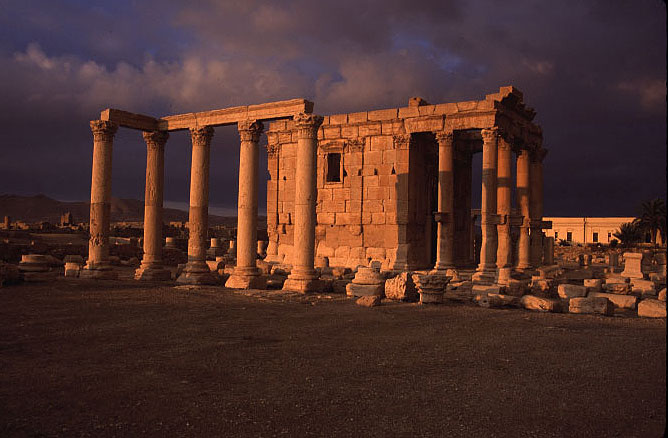
As with Bosra, there were no ropes, no fences, no signs telling you not to do something. Just wander about as you see fit. And, I saw fit to do lots of things. As the day was getting on in length, whatever tourists the town held were elsewhere. This meant that the touts were elsewhere as well, and I was able to wander about some of the ruins without being disturbed by someone trying to sell me postcards.
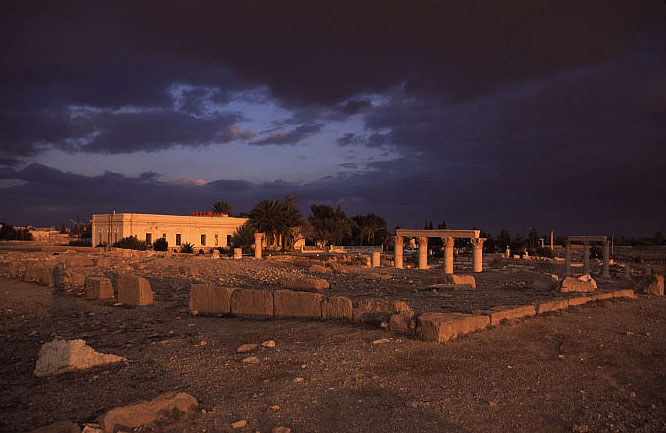
Palmyra was an ancient city strategically placed in the desert, its presence due to the fact that it had reliable water during past ages (dry now). The name Palmyra refers to the large number of palms in the area, but in older days the city was known as Tadmoor. It dates to pre-Roman times, but most of the structures that were left were due to the Romans, and later to Muslims. On the overland trading routes with far Asian, Palmyra is either the last stop before reaching the safety of Beirut and Damascus, or the first stop coming out. I had seen silks, the National Museum in Damascus, dating back 2000 years that had been found in Palymra. The source of the silk was China.
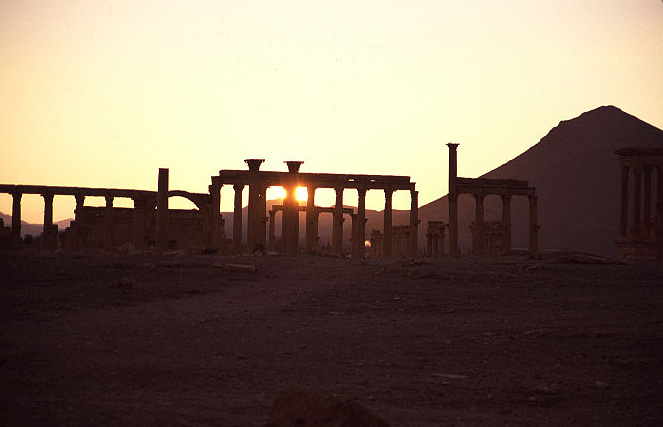
At one point in the history of the important city, there came to the throne a empress known as Zenobia. There seems to be some controversy over how she came to the throne and what happened later, but it seemed to be well established that she kicked the Romans out of the city, and eventually out of a large portion of the Levant. Later, a famous Roman emperor personally the Roman legions to Palmyra and subdued her.
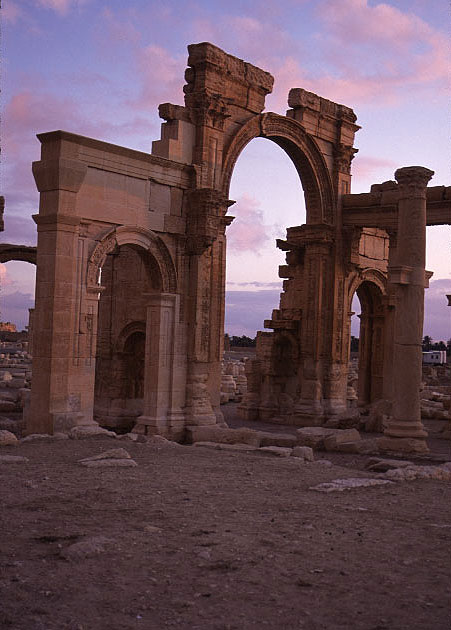
Zenobia was hauled back to Rome where she was either treated like a queen, or locked up in a sea side palace. Again, there seems to be some confusion over what happened to her next. She might have fallen in love with the Roman emperor and lived out her life with him. Or, she might have lived a celibate life before jumping off a cliff in a fit of melancholy.
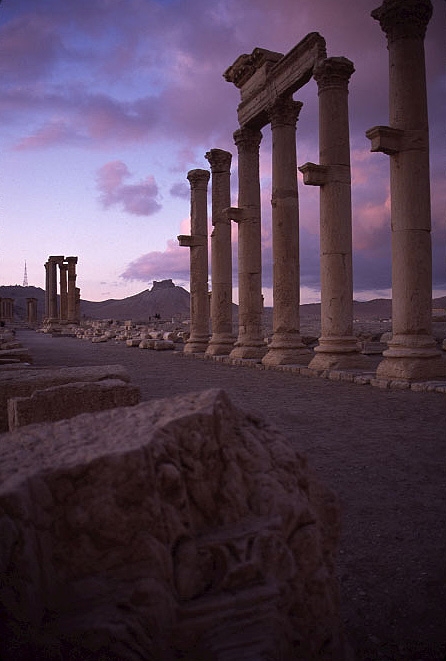
Palmyra continued as an important city for trade, but with the rise of Islam it was quickly removed from Byzantine rule and placed under an Arab military governor. The governor built a large citadel on the largest hill in the area and I could see it glowing pink in the distance. There wasn't supposed to be much up there and wasn't planning to take the trouble to go out there (it involved paying large sums of money to a variety of people).
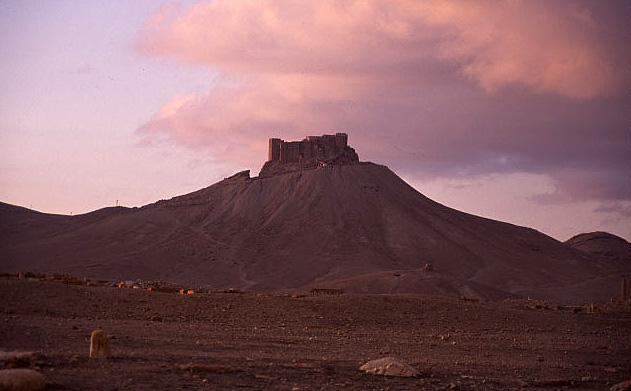
Under Muslim rule, Palmyra continued as a city and seemed to be remarkably well preserved. It had been visited by the great English explorers of the Victorian era, including one Sir Richard Francis Burton and T.E. Lawrence.
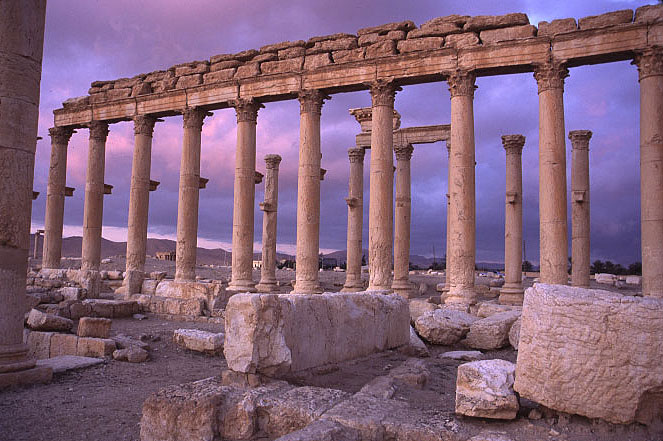
Strolling through antiquity in a light that cannot be experienced anywhere but in the desert, I thought about how perfect my timing had been. This could be simple chance, but I liked to think that Providence was once again on my side.
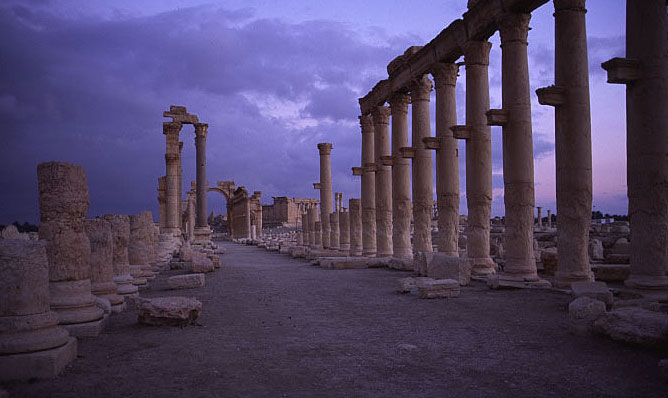
As the last of the light began to pass, the columns of the ruins lost their pink color and the world started to get black once again.

I was getting hungry anyways and so began to stroll back through the ruins toward town. I had only explored about the first fifth of the ruins and was eagerly anticipating the upcoming morning.
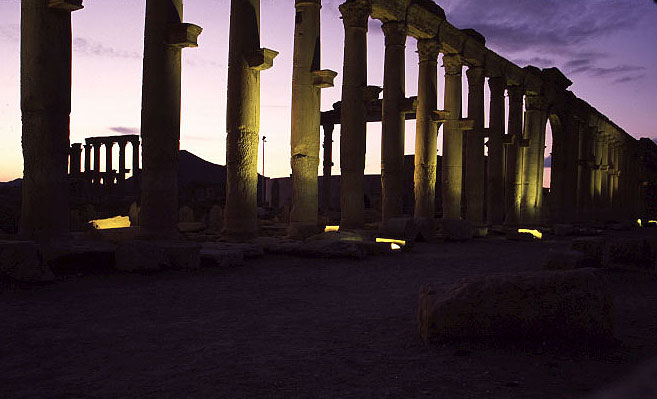
I found a mostly empty restaurant and ordered up a large feast of kebabs, bread, pickles, hummus, labna, and a glass of arak at the end. While it would have been cheaper to eat on the street, it was cold in the desert at this time of year and there were few street vendors out in the darkness. No one, in fact, was out in the darkness. Emboldened by the arak, I set off for a brief evening stroll through the empty, dark streets of the town before ending up back in the frigid hotel. I sat with the young assistant drinking a few beers and watching a soccer match while fending off his attempts to introduce me to a friend of his that would take me to another person who might sell me a fake international student ID, which would save me money on entrance fees to the various monuments in Syria. This I had no intention to do as the Syrian government had already reduced the fees by 50% and I didn't particularly like the idea of defrauding the Syrian government. Or, rather, I didn't like the idea of being caught defrauding the Syrian government. Moreover, the fake was going to cost something like 500 pounds, which end up saving me about 100 pounds in the end. I retired to my cold room and my bottle of Arak to think over the day, but mostly to get under the heavy blankets and try to warm up.
It was exceptionally cold last night, and it was still exceptionally cold this morning when I got up. I wanted to get out to the ruins in the early morning light and was up more or less with the sun. The assistant was sleeping behind the counter and it took some effort for me to wake him to pay my bill. I had offered to pay last night, as I was planning to leave early in the morning, but he had told me to wait until now. It was 8 am when I strolled out toward the ruins intending to look around one of the pay-sites: The Temple of Bel. It took five minutes to convince one of the old men sitting in the office that I really did not want a guide and preferred to be in the area by myself.
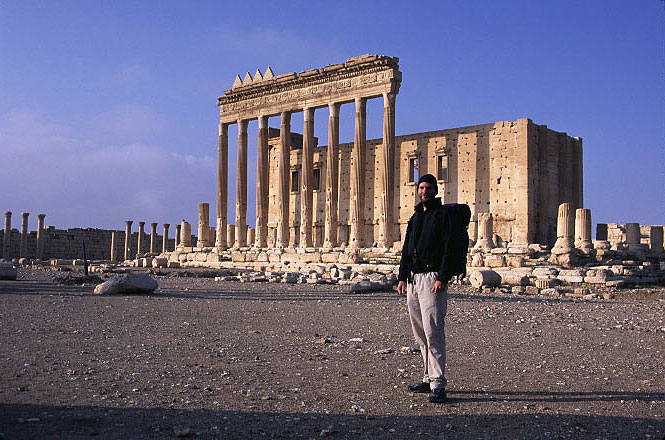
I spent the better part of two hours looking around the Temple complex and was a little disappointed. The complex was as nice as the surrounding ruins, but not by much and it paled in comparison to the Temple of Bacchus at Baalbek. The complex was about 100 meters square and consisted mostly of the Temple and a few other stone ruins. There were, however, some nice relief carvings/
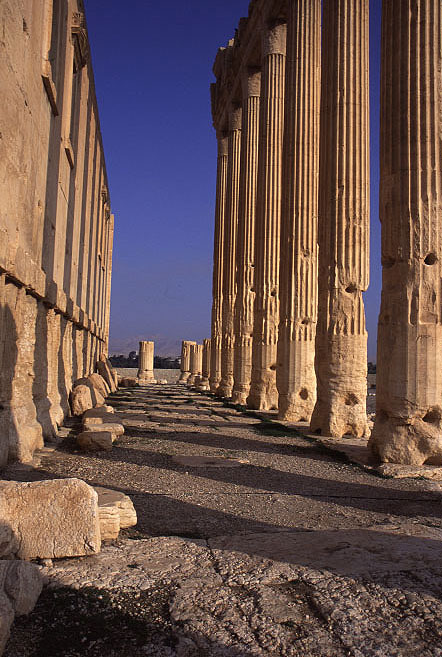
The carvings dated from very early times (pre-Christian, it seemed by the signs), but yet used symbols that I normally associated with Christian paintings, namely about the head. By the time I was heading out of the complex a few tourists were rolling in, along with some mist which began, oddly enough, to settle into the area as the sun moved higher in the sky.
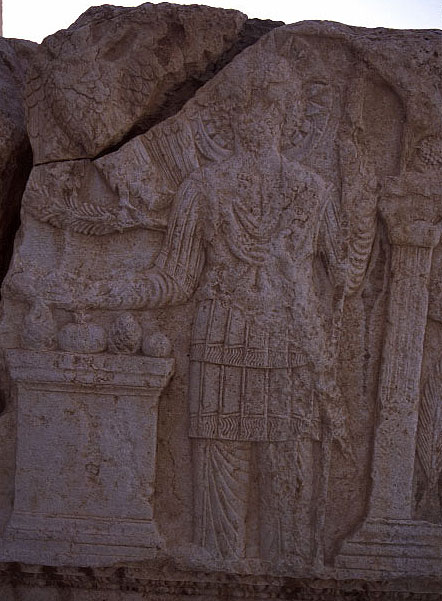
I proceeded in a fog of my own to rumble around the Old City, paying visits to the theater and other areas. I didn't have any particular plan in mind, but the lay out of the Old City lent itself very naturally to wandering about. There was a single long street, and occasionally side streets or buildings would branch out. The lack of ropes or barriers allowed to me to mill about in the fog and work my way through the ruins in a highly unsystematic way.
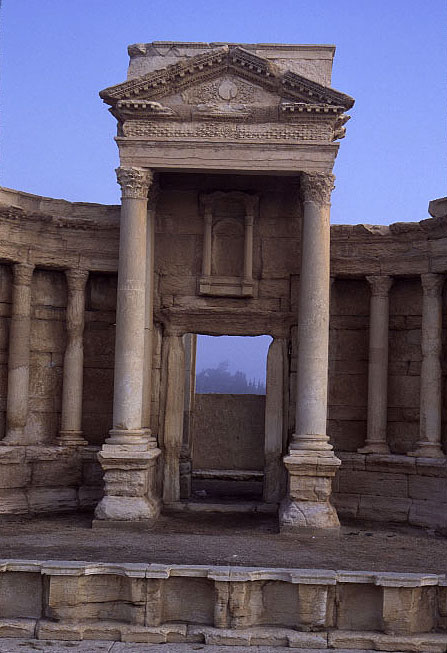
Near the theater I saw the first of the camel tourmen coming into town for the day's trade. I couldn't imagine wanting to ride a camel for an hour, particularly as being on foot was so much more pleasant, but apparently these "bedu" did something of a business.

The mist cleared up as mysteriously as it came in and I began to notice more and more tourists coming in from the town. I was nearly at the edge of the Old City and so strategically placed to avoid camel touts and postcard vendors. No one had made it out my way yet and I was happy to have the run of the place.
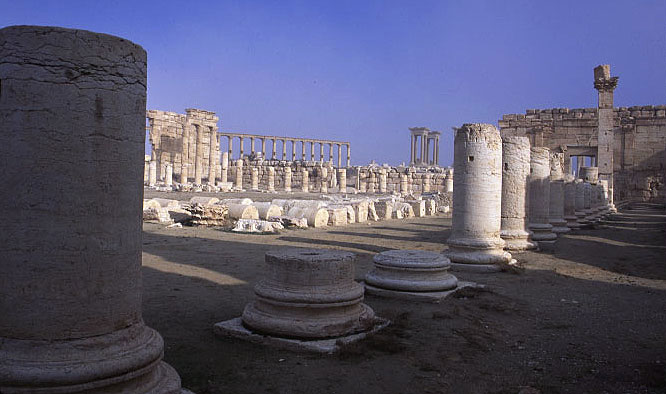
Near the end of town was a structure that my book called the "Tetrapylon". I suppose this has something to do with the fact that the structure consisted collections of four pillars, but couldn't be sure. The book wasn't descriptive enough to indicate anything more than the name of thing. Not being knowledgeable in Roman architecture I could only guess and the uses of various buildings and decided that the Tetrapylon was place for Romans to hangout and be seen.
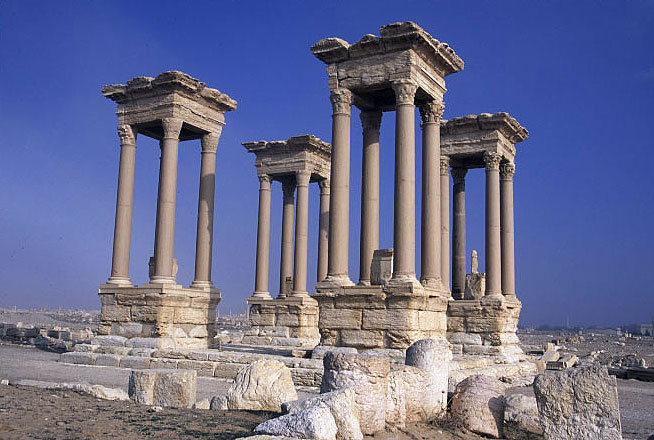
I decided to leave the Old City and wander out toward the Funerary Tombs. The Funerary Tombs are buildings where people were buried and located on the outskirts of town (a necropolis). There contents had long since disappeared to grave robbers, museums, or other types who value old stuff and you were free to visit them. Of course, there was the matter of the daunting one kilometer (or what is 800 meters?) walk from the Old City out to them. The largest of the them had a gate around it, and you had to pay some money so that you could climb up to the top of it, but all the other ones were free. I saw no reason to pay any money, so I headed out on foot.

I spent another hour poking around through some of the towers, being careful with where I put my feet, and was surprised that none of the other tourists had made it out this far.
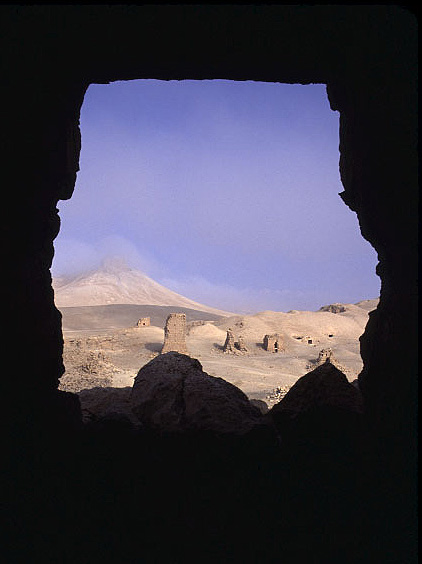
A little bored by all the antiquity I decided to go for a stroll and climbed up to the top of a large hill overlooking the Old City, New City, and even with a great view of the Arab Castle on top of an even larger hill. On my way up to the top, I ran into a goat herder and his flock who immediately reached for some post cards and came running over to me, anxious to supplement his family's income by selling me something. I waved hello, turned down the postcards, and then continued up hill. He didn't seem surprised that I had not bought a postcard, but rather that I was out walking.
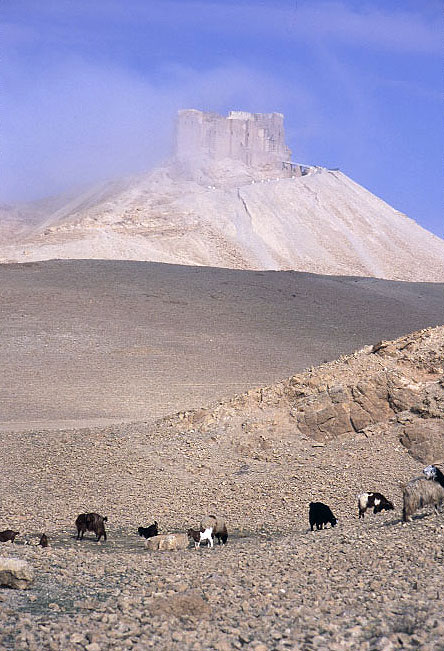
I sat on top of the hill until I got cold in the open, exposed air, and then sat for a while longer. I was happy be where I was and was dreading the walk back through the Old City. I could see tourists milling about and various touts and other vendors peddling their wares. I considered making a wide detour around the Old City, but thought better of this as it would be more trouble than it was worth. Quite cold, I came down off the hill and explored a few of the outlying areas of the Old City that I had met before making my way through the Old City.
It started slowly with a woman inviting me into her tent for tea (this seemed a little non-traditional to me). Small boys calling out for pens (why do small boys in the developing world always ask for pens?). A man wanting to guide me through the Old City. A man wanting to guide me to the Arab Castle. A man wanting to guide me to the Funerary Tombs. A clutch of boys wanting to take me on a camel ride. And the innumerable postcard men. I was quite happy to reach the other edge of the Old City and the end of the heavy tourist quarter. Seeking some refuge, I found the bus stop and bought a ticket for Hama. I still had a few hours and spent them wandering about the excellent museum and then on the streets. Eventually, however, the constant hawking of wares got to be too much and I sought refuge inside of the very touristy Palmyra restaurant, where I had eaten last night.
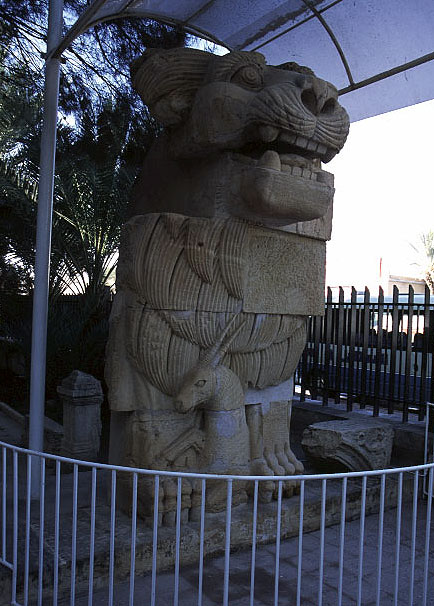
I ate and stayed inside the restaurant until I could see my bus roll up, at which point I paid my bill and walked straight to my bus, avoiding yet another opportunity to replace my K-mart watch. The ride was comfortable although a bit slow due to the habit of stopping to pick up every person along the side of the road. I didn't particularly mind, as I was seated next to a medical student who spoke excellent English. He had studied in Cairo and Germany and was now in residence in Homs, through which we passed. Before he got out, he pointed out to me a Palestinian refugee camp, which I have not the will to describe. The Palestinians were not looked upon favorably by the Syrians I had met, probably because the only specimens they saw were from the camps. The Palestinian cause was, perhaps, in vogue in the media. On the streets, it seemed that the Syrians just wanted them out of their country.
I got off the bus and stepped into the thickly populated bus station at Homs a little bewildered by all the people. It took me only one or two utterings of "Hama? Hama?" to find my way onto a mini bus that took off as soon as I got on. By the time we got to Hama it was quite dark out and I was completely unoriented to the city. It seems like it would be reasonable to catch a taxi into town, but I felt like stretching my legs a bit and seeing what went on at night in a Syrian town. I had no idea which direction to head, and so picked one at random and set off into the black night air. I vaguely thought that I was heading the right way when I passed a large mosque and saw in my guidebook that there was a large mosque on one of the crude maps. I then realized that finding a large mosque in Syria might not be that unique of an identifier.

I passed construction sites and more mosques, empty parking lots and residential areas, and finally found a hill from which I could spot the lights than must mark the downtown area. I zig-zagged my way there and eventually found myself on a large, commercial street which I took into the downtown. When I saw something resembling a super-market, I knew that that would be unique enough to identify my exact location on the map. Indeed, 10 minutes later I was at the Hotel Cairo, where I planned to spend the night.
The room ran me 175 pounds and had television. Even better, I was sharing it with a cute twenty something British girl who had been traveling for a while and had many fun stories to tell. I was starving, however, and had to leave her company to find some street food. I found the best felafel yet at a stand near the hotel. It seems that every town has there own style, as the pickles here are slightly different, the tahini sauce is a little thicker, and they use lots of fresh mint. The bread is much thinner and really made for an excellent meal. I walked down to a liquor store for another bottle of arak and picked up a chicken shawarma (wow!) for a second deal, and a quarter kilo of various pastries for desert.
I ate, washed clothes and talked with my room mate for a while, trying to figure out what to do over the next few days. The hotel runs a reasonable tour to several of the places in the area that I was planning to go to. A little extra money in return for potentially fewer problems. I ran the idea by my the cutie, who replied with the British equivalent of, "Are you daft?" She pointed out to me, quite correctly, that I could look at pictures of the places in a photoalbum if I was in such a rush to see them. Better, however, to get to meet people along the way. No organized tour for me.































